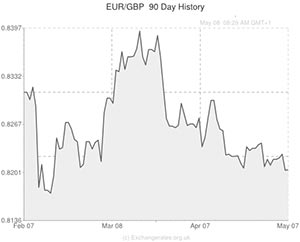
Although the European Central Bank refrained from introducing any additional stimulus at today’s policy meeting, the Euro put in a patchy performance during European trading.
As economists expected, the news that Eurozone consumer price inflation increased modestly prompted the central bank to leave policy unaltered and interest rates unchanged.
The deposit rate remains at 0 for another month while the benchmark interest rate stays at a record low of 0.25 per cent.
However, while this move was Euro-supportive, ECB chief Mario Draghi also used this opportunity to attempt to talk down the Euro.
The Euro has strengthened considerably against peers like the US Dollar and Pound over the past 12 months, a circumstance which is putting pressure on the Eurozone’s exporters.
The Euro to Pound exchange rate is trading in the region of 0.8247.
Draghi intimated that the Euro exchange rate had been a point of discussion at this policy meeting. While he observed that the rate isn’t a policy target, he added that it is taken into consideration and the Euro’s current strength is a ‘cause for serious concern’.
Draghi also intimated that additional policy action could be taken before the end of summer. He commented; ‘The Governing Council is comfortable with acting next time, but before we want to see the staff projections that will come out in early June. There wasn’t a decision today. It’s a preview of the discussion we will have next month.’
The Euro pared initial gains against the US Dollar after the press conference.
Earlier in the European session the appeal of the Euro was undermined by the news that industrial production in Germany fell unexpectedly.
Industrial production declined by 0.5 per cent in March, month-on-month, rather than increasing by the 0.2 per cent forecast.
This drop was the first for five months and almost wiped out the previous month’s 0.6 per cent gain.
The report is further proof that the pace of economic growth in Germany slowed as the second quarter got underway.
In the opinion of economist Lothar Hessler; ‘There was a robust first quarter for industrial production. The main risk factors are China and turbulence due to the Ukraine crisis’.
Meanwhile, the Pound was holding steady against its currency counterparts after the Bank of England acted in accordance with expectations, leaving interest rates unaltered and policy unchanged.
In the immediate aftermath of the ECB announcement the Euro to GBP pairing rallied. However, Sterling went on to recoup losses as investors digested Draghi’s comments.
With trade figures for both Germany and the UK due for publication tomorrow, further GBP/EUR volatility can be expected.
The Pound may also be moved by UK industrial/manufacturing production reports and construction output data.
The UK’s NIESR GDP estimate will be of particular interest before the weekend.
Euro to Pound Update 10:45 GMT on 09/05/2014
While this week’s impressive UK service sector data continues to lend the Pound underlying support, the Euro has been crushed by the dovish ECB and the EUR/GBP pairing is poised for a weekly drop.
The Euro was also softer against the US Dollar on Friday as Germany’s lacklustre trade report further lessened the appeal of the common currency.
Yesterday European Central Bank President Mario Draghi intimated that the Governing Council was ‘comfortable’ with the idea of introducing additional stimulus in June.
In the aftermath of Draghi’s press conference the Euro posted widespread declines and sank to a 2 ½ month low against the Pound.
As European trading began on Friday, the Euro came under additional pressure as a result of disappointing German trade data.
In March, German exports unexpectedly dropped by the most for almost a year.
Although economists had anticipated an export increase of 1.3 per cent they actually declined by 1.8 per cent following a revised drop of 1.4 per cent in February.
Meanwhile, imports were down by 0.9 per cent versus expectations for a 0.6 per cent increase.
This left Germany with a trade surplus of 14.8 billion Euros in March, down from a surplus of 15.8 billion Euros the previous month and less than the 16.6 billion Euro surplus expected.
ING economist Carsten Brzeski said this of the result; ‘As already reflected in other industrial data, the month of March saw a stronger real economic impact from the Ukrainian crisis and the
Chinese slowdown than confidence indicators had suggested. All in all, with ongoing geopolitical problems and the slowing emerging economies it looks as if Germany’s famous export engine could still be spluttering for a while.’
The Pound was also boosted by the news that UK manufacturing output increased by more than projected in March, with output rising by 0.5 per cent in February.
However, Sterling’s upward momentum was slightly tempered by the fact that UK construction output unexpectedly faltered in March.
While the Euro is likely to remain softer over the weekend, movement in the common currency could occur next week as a result of ZEW economic sentiment surveys and inflation data for Germany and the Eurozone, industrial production figures for the currency bloc, German/Eurozone GDP, the publication of the ECB’s monthly report and Eurozone trade balance figures.
Euro Exchange Rates
[table width=”100%” colwidth=”50|50|50|50|50″ colalign=”left|left|left|left|left”]
Currency, ,Currency,Rate ,
Euro, ,Pound Sterling,0.8171,
,Pound Sterling,0.8171,
Euro, ,US Dollar,1.3818,
,US Dollar,1.3818,
Euro, ,Canadian Dollar,1.4957,
,Canadian Dollar,1.4957,
Euro, ,Australian Dollar,1.4769,
,Australian Dollar,1.4769,
Euro, ,New Zealand Dollar,1.5990,
,New Zealand Dollar,1.5990,
US Dollar, ,Euro ,0.7234,
,Euro ,0.7234,
Pound Sterling, ,Euro,1.2236,
,Euro,1.2236,
Canadian Dollar, ,Euro,0.6680,
,Euro,0.6680,
Australian Dollar, ,Euro,0.6765,
,Euro,0.6765,
New Zealand Dollar, ,Euro,0.6251,
,Euro,0.6251,
[/table]

Comments are closed.